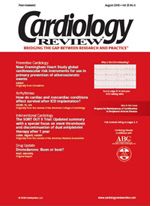Publication
Article
Cardiology Review® Online
Delaying diabetes can also delay vascular events
Diabetes and coronary
heart disease
San Diego—Delaying the onset of type 2 diabetes has a substantial impact on predicted vascular events, found researchers from the Cardiff Research Consortium, United Kingdom, who presented their data at the American Diabetes Association’s 65th Annual Scientific Sessions.
Led by Phil McEwan, PhD, director and senior research mathematician, they predicted the incidence of microvascular and macrovascular events and costs associated with type 2 diabetes by following a cohort of 1,000 newly diagnosed diabetes patients over a 20-year horizon.
Depending on the risk equation used in the analysis, up to 16 coronary heart disease events could be avoided by delaying diabetes by 2 years, up to 68 could be avoided by delaying it for 5 years, and up to 122 could be avoided by delaying it for 10 years. The maximum number of stroke events avoided was 37, 92, and 143 for
2-, 5-, and 10-year delays, respectively. The number of cardiovascular deaths avoided was as high as 22, 70, and 129 for delays of 2, 5, and 10 years, respectively.
The maximum number of retinopathy, nephropathy, and neuropathy events avoided following a 10-year delay in the onset of diabetes was 453, 325, and 107, respectively.
Cost savings were also associated with delaying diabetes, they found. “Increased awareness of the benefit of delaying or preventing the onset of diabetes is essential, and substantial clinical and economic benefit can be obtained,” said Dr. McEwan.
In other data presented here, a blood glucose level of 100 to 125 mg/dL, known as “prediabetes,” is associated with an increased risk of cardiovascular complications and significantly elevated health care costs, said Gregory A. Nichols, PhD.
According to Dr. Nichols, senior research associate at Kaiser Permanente Center for Health Research, Portland, Ore, annual health care costs for persons with blood glucose levels toward the upper range of prediabetes were 31% greater than the costs for persons with normal blood glucose levels, “with many of the extra costs due to cardiovascular disease, which is expensive to treat but far less expensive to prevent.”
In a 9-year study, 28,335 Kaiser Permanente participants with elevated levels of blood glucose but without diabetes were stratified into two groups: those with blood glucose values of 100 to 109 mg/dL (stage 1 prediabetes) and those with blood glucose values of 110 to 125 mg/dL (stage 2 prediabetes). Most of the patients remained in their original stage, but 3,281 progressed.
The subjects were followed until they advanced to the next stage of blood glucose level; received an oral antidiabetic drug, indicating a diagnosis of diabetes; terminated their health plan participation; or reached the end of the 9-year study period.
Annual costs adjusted for age and sex were $4,357 for patients with normal glucose levels, $4,580 for those with stage 1 prediabetes, and $4,960 among those with stage 2 prediabetes. When excluding those subjects who progressed to stage 2 prediabetes or diabetes, the annual costs for subjects with normal blood glucose were only $3,799. The increased costs with elevated fasting plasma glucose were observed for inpatient, outpatient, and pharmacy expenses.
Examination of diagnostic codes revealed a greater prevalence of cardiovascular disease and obesity in those with elevated fasting glucose levels, to which the authors attributed the higher medical costs.





